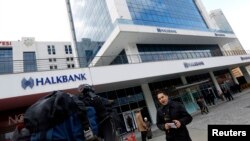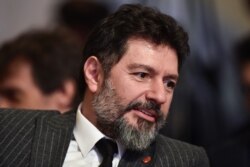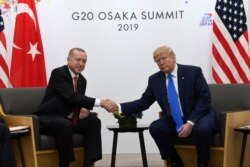The fate of one of Turkey's largest state banks is increasingly entwined with the future of Turkish-U.S. relations. Halkbank, already on trial in federal court in New York, is now being targeted by Congress.
Turkish President Recep Tayyip Erdogan met Wednesday with President Donald Trump on the sidelines of the London NATO summit. Erdogan is believed to have raised the fate of Halkbank.
Ever since Halkbank became the target of judicial investigations into alleged violations of U.S. sanctions on Iran, Erdogan has turned to Trump to try to close down the inquiries. The Turkish lender paid millions to lobbyists and law firms in its effort to prevent the opening of a court case against it.
In October, the U.S. attorney for the Southern District of New York opened a case against the bank. The move reportedly took Erdogan by surprise, describing it as an "ugly decision." With the opening of the case coinciding with Turkey's launching of an operation against a Syrian Kurdish militia that is an American ally, Ankara is crying foul.
'Political' case
"This Halkbank case would be more political than judicial," said professor Mesut Casin, a foreign policy
adviser for Erdogan. " … If there is a necessary punishment, it should be resolved inside the company. It should not be the responsibility of the U.S."
Halkbank has for years been mired in controversy. Last year, Hakan Atilla, a vice president of the bank, was jailed for Iranian sanctions violations. New York prosecutors are now targeting the bank itself on charges of assisting Iran in circumventing tens of billions of dollars’ worth of American sanctions.
Analysts say that given the scale of the alleged violations and that they involve Turkey's second-largest state lender, the repercussions of the case could be far-reaching.
"Halkbank is one of the key and specialized banking institutions," said political scientist Cengiz Aktar. "If something happens in the United States, it will have huge consequences."
Until now, international markets have largely dismissed the case. "Threats of sanctions and fines against Halkbank have been going on for years, so markets are largely bored by the case," said an analyst specializing in Turkey for an international bank, who spoke on the condition of anonymity. "There will only be a reaction if something actually happens, in terms of fines or sanctions."
Investors wary
Halkbank's refusal to offer a defense in the New York trial, though — arguing the court has no jurisdiction over it — is starting to unnerve international investors.
"The market is worried that if Turkey is not cooperating with the U.S., those negotiations would not yield much, and Halkbank would face a large fine," the anonymous analyst said. "There's still concern about a Halkbank fine because a fine in the neighborhood of billions of dollars would be a big burden on Turkey's balance of payments."
Adding to market concerns are local reports Halkbank has not made any provisions for a significant fine. The bank has refused to comment on these reports.
The state lender's woes appear ready to escalate. Next week, the U.S. Senate is expected to consider sanctions legislation against Turkey for Ankara's military operation against a Syrian Kurdish militia, the YPG, which is a key American ally in its war against the Islamic State group. Among the measures are actions against Halkbank.
"The House bill and the two Senate versions would all sanction Halkbank," said analyst Atilla Yesilada of Global Source Partners, a business management consultancy based in New York.
"Credible threats of American sanctions have in the recent past triggered very large and damaging currency shocks," he added, "which boosted inflation and undermined corporate balance sheets."
Previous sanctions
The Turkish economy is still recovering from Washington sanctions imposed last year over the detention of an American pastor who was subsequently released.
Analysts note that Erdogan and Trump appear to have developed a good relationship, one that could give Ankara some respite, albeit temporary.
"I don't think Senate Majority Leader [Mitch] McConnell would allow a Turkey sanctions bill to be brought up to the floor before the Trump impeachment," said Yesilada. "McConnell probably would not want his flock to register loud displeasure about Trump's Middle East policy,” nor would he want moderate Republicans to face the prospect of hearing disparaging remarks from Trump if the sanctions bill were to pass.
Given that there is strong bipartisan support for Turkish sanctions legislation, any Trump veto could be overturned. And with the Turkish economy in such a precarious state, any severe sanctions, particularly against a critical bank, could plunge Turkey into chaos. That could push U.S.-Turkish relations to the breaking point.
Until now, there has been little appetite for such a move, given the importance of Turkey as an ally, albeit a difficult one.






